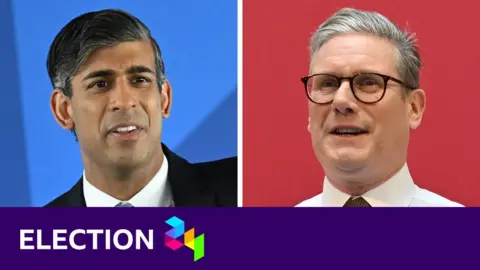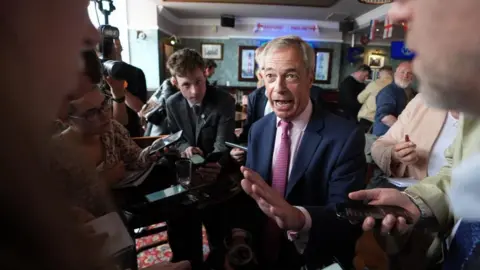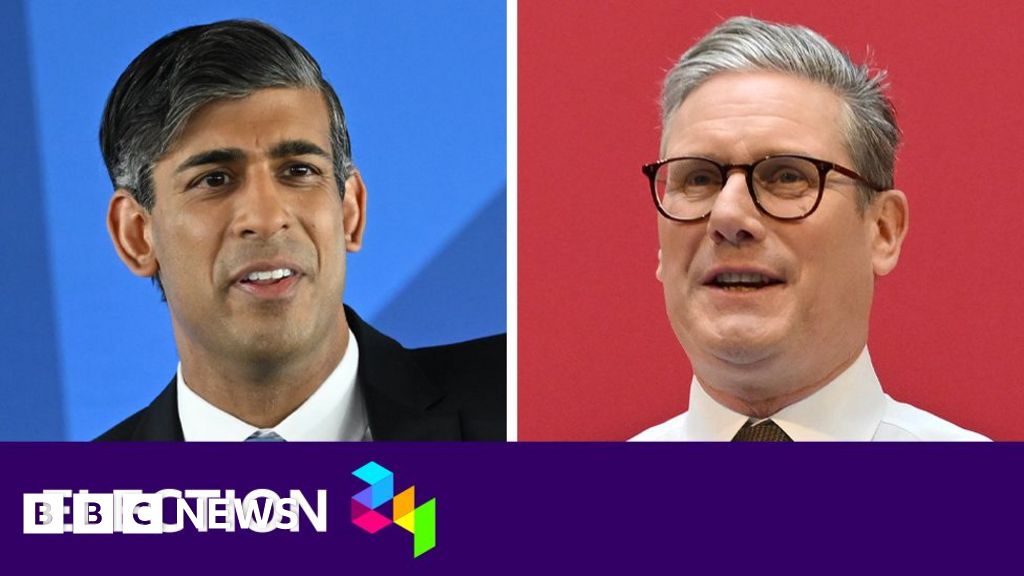By James FitzGerald, BBC News, London
 BBC
BBCMillions of people across the UK are readying themselves to vote in Thursday’s general election, as Prime Minister Rishi Sunak battles to keep opposition leader Sir Keir Starmer out of 10 Downing Street.
Mr Sunak’s Conservatives and Sir Keir’s Labour Party have spent the final days of the campaign reinforcing their key messages in a bid to win over wavering voters.
Faced by poll after poll indicating a sizeable lead for Labour, the Conservatives are warning voters against allowing their rivals a huge majority – with one minister conceding that he expects a landslide. They also face a threat from right-wing party Reform UK, buoyed by the return to front-line politics of Nigel Farage.
But after four election defeats in a row and 14 years in opposition, Sir Keir’s party says it is taking nothing for granted.
Although themes such as living standards, health and immigration have dominated the national debate, smaller parties such as the Liberal Democrats and the Green Party of England and Wales have pushed their own priorities as well.
Here is everything you need to know as the country heads to the polls, with 650 seats in the House of Commons up for grabs.
Starmer vows change as Sunak promises tax cuts
Mindful that it has not won a general election since 2005 – and that its last result in 2019 under left-wing former leader Jeremy Corbyn was its worst for almost a century – Labour under Sir Keir has sought to show voters it has changed.
Sir Keir says the top priority for his government would be to grow the economy and through this improve living standards for the general population.
UK household finances have taken a hit in recent years due to soaring inflation, experienced globally, and the highest tax burden in decades. However, Conservatives say this is a consequence of issues outside of their control, such as the Covid-19 pandemic and the war in Ukraine. They also claim the tax burden would worsen under Labour.
One of Labour’s most-discussed plans to raise money involves applying value-added tax (VAT) to private schools.
Mr Sunak, who took office in October 2022, has proposed tax cuts for the self-employed and a return to an era of mandatory national service for young people.
Like Labour, he is also promising to boost home ownership.
Mr Sunak is reiterating his aim of sending some asylum seekers to Rwanda in a bid to curb illegal migration – a pre-existing plan that has been mired in years of legal difficulties before it was approved by Parliament in April.
Immigration dominates – but Brexit absent
 PA Media
PA MediaImmigration is at the heart of some of the key pledges of the Reform UK, which says it would freeze “non-essential” migration. Although it has just one MP, the party is consistently polling in third place.
Reform is a successor to the Brexit Party, which fought for a “hard” withdrawal of the UK from the European Union. Despite being a major part of the Conservatives’ legacy, Brexit has been largely absent from the election campaign.
The Liberal Democrats have pledged to reverse one aspect of Brexit by re-joining the European single market. As the party continues to recover from a 2015 election thrashing, it is also promising major investment in social care.
Meanwhile, the Green Party of England and Wales – which currently has one MP – is running on a platform that includes new taxes on the wealthy and a policy of net-zero emissions by 2040.
Gaffes and scandals characterise campaign
Sir Keir and his colleagues have not only attacked their adversaries’ track record in government – including a tumultuous period in 2022 when the UK had three prime ministers in a matter of weeks. They have also criticised the culture at the top of the Conservative Party, highlighting a recent alleged betting scandal.
Mr Sunak was also knocked off his key messaging earlier in the campaign when he was forced to apologise for his early exit from an event in France at which global leaders commemorated the 80th anniversary of the D-Day landings in World War Two.
But the Tories have managed to land blows on Reform, whose candidates have been caught in controversies of their own. Its new leader Nigel Farage, on his eighth attempt at winning a Westminster seat, triggered a backlash by suggesting that the West “provoked” the war in Ukraine.
Labour has not been immune to pre-election headaches of its own, not least with a row over whether it would pick veteran left-winger Diane Abbott as a candidate.
And Lib Dem leader Sir Ed Davey was prompted to clarify that he takes voters’ concerns “extremely seriously”, after a string of electoral stunts – including a plunge in a lake – that he said were designed to call attention to his policies.
 Reuters
ReutersParties rely on support across the nations
Sir Keir and his Labour candidates hope for a strong showing in Scotland – where polls suggest the SNP is at risk of losing Westminster seats after more than a decade of dominance. The nationalist party has been in a period of turmoil during a police probe into its finances.
Its new leader John Swinney, appointed in May, has vowed to keep up his fight for Scottish interests, by ratcheting up pressure for a second vote on independence from the UK, and by reversing the “damage of Brexit”.
Wales’s own nationalist party, Plaid Cymru, aims to build on the three MPs it has at Westminster, running on a platform that advocates Welsh independence to deliver “real fairness and ambition”.
In Northern Ireland, the election is fought along constitutional battle-lines between unionists, who want to keep the union with Great Britain, and nationalists, who would prefer NI to join the Republic of Ireland.
NI parties generally do not have a huge bearing on Westminster politics. The main nationalist force, Sinn Féin, has for decades taken a policy of not taking any Westminster seats it is elected to.
But the role taken by the DUP in propping up a previous Conservative government highlights that NI parties can take a prominent role in the event of a close vote.



